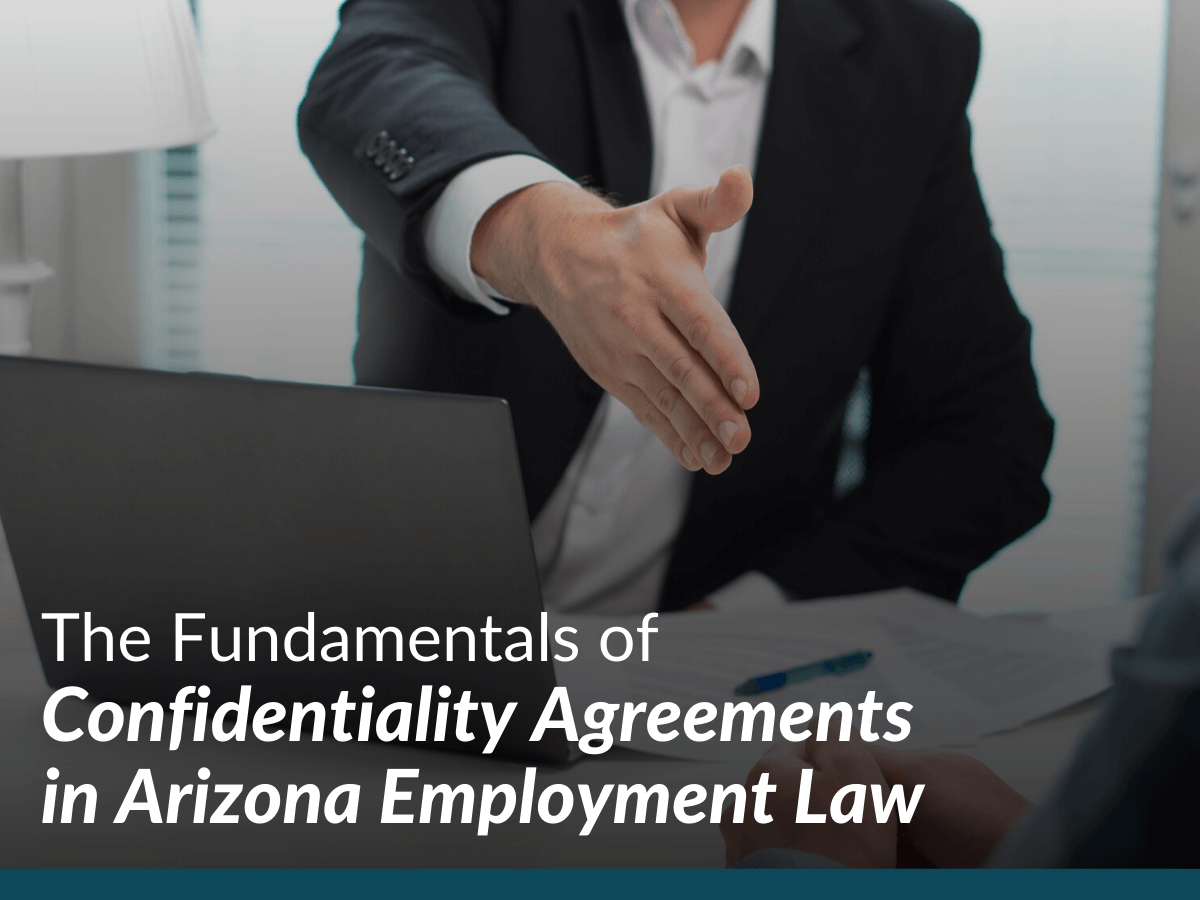The Fundamentals of Confidentiality Agreements in Arizona Employment Law
Confidentiality agreements, also known as non-disclosure agreements or NDAs, are an important part of many employment agreements in Arizona. An NDA is a contract between an employer and employee in which the employee agrees not to use or disclose the employer’s proprietary information, except within the scope of the employee’s work duties.
For employers, these agreements can be an important way to protect privileged information, such as client lists, business methods, and other trade secrets from being used against them by a competitor or a former employee. For employees, these agreements can limit employment options with competitors of their employers. Because of the possible impact on the employee’s potential future employment, it is important for a Scottsdale employment lawyer to help you understand the limitations imposed by an NDA and whether it is enforceable.
To help both employers and employees navigate NDAs, here are the fundamentals of confidentiality agreements in Arizona employment law.

Contractual Confidentiality Agreements
As mentioned above, a confidentiality agreement, or NDA, is a contract between an employee and employer. Oftentimes employers require prospective employees to sign these agreements as part of an employment agreement before starting work for the employer.
However, simply having an NDA in place is no guarantee that confidential information is safe. In Arizona, courts will only enforce NDAs if they are “reasonable,” meaning that overly restrictive NDAs may not protect an employer’s confidential information if the matter goes to court. A reasonable, and therefore enforceable, NDA is one that is appropriately restrictive in time, geography, and content. This means that the NDA can’t bind an employee for an unreasonably long amount of time. It also means that attempting to create an unreasonably large definition of what is confidential information typically won’t hold up. Although this can seem like a vague standard, just keep in mind that courts like to see NDAs that appear tailored to protecting an employer’s confidential information—not restricting competition.
That being said, because NDAs (unlike non-competition agreements) tend to restrict only what information employees may disclose, and not their ability to actually find and keep employment, courts are generally willing to enforce NDAs. Highly restrictive NDAs with very broad language, however, can start looking like non-competition agreements, something courts don’t usually permit. An NDA that is so broad that it restricts an employee from essentially doing anything at all is likely to be unreasonable and therefore unenforceable.
On top of having a well-drafted NDA, employers need to consider two other major factors when trying to protect confidential information. First, what our Scottsdale employment attorneys want you to consider is that any company requiring employees to sign an NDA needs to take steps to protect the confidential information the NDA is supposed to protect. When it comes time to enforce an NDA, this shows that confidential information has real value to the employer because the employer has put time and effort into protecting it. In fact, if an employer has not taken reasonable steps to protect the confidential information from disclosure, then the court will usually find that it wasn’t confidential information to begin with, and will refuse to enforce the NDA.
Second, information that is generally available to the public usually can’t be protected by an NDA. For employers or others wanting to protect certain information, this means making sure the information doesn’t leak in a way that it then becomes readily available. If your competitor can pull up your trade secrets on Google, it’s not a trade secret anymore, and isn’t entitled to any protection. One exception to this is that sometimes an employer’s customized compilation of public information can be confidential information, if it took time to select and compile it, and if the compilation has value and is carefully protected.
If you have valuable proprietary information you want to protect, it’s a good idea to not only consult an attorney who can help you draft a non-disclosure agreement for potential employees, suppliers, etc., but also to sit down with a Gilbert employment attorney with experience in business and intellectual property law who can help you develop a strategy to keep your important business information secure.
Legal Protections for Confidential Information
Even where no NDA is in place, Arizona law does protect confidential information to a certain extent. The primary protection for confidential information under Arizona law is the Arizona Uniform Trade Secrets Act, or AUTSA. The AUTSA makes it illegal for anyone to misappropriate the trade secrets of another. Trade secrets are relatively broadly defined and include essentially any information that is kept secret and provides a business advantage to those who know the information. However, Arizona courts have held that certain types of information that may be valuable to businesses are not considered trade secrets under the AUTSA, so it’s safest to have an NDA in place to make sure all proprietary information is protected.
As to what constitutes misappropriation, the rule is that any information obtained or used without the consent of the person who owns the rights to the trade secret is considered misappropriation, subject to certain exceptions, such as where the information is generally known or available to the public.
Additionally, using information that someone knows or should know has been unlawfully acquired constitutes misappropriation. This means a business hiring an employee of its competitor must be careful when using information provided by that employee, as there is a risk that the employee has taken, or even still has access to, protected information from their previous employer. It should go without saying, but deliberately working with a former employee of a competitor, in an effort to get the competitor’s confidential information, violates the law and could create huge liability for the new employer. Our Arizona employment law office is equipped to help handle these types of matters and disputes for your business.
Another protection for confidential information under Arizona law is employees’ fiduciary duties to their employers. In Arizona, employees owe certain duties to their employer while they are employed by that employer. These duties include the duty of loyalty, which means among other things that an employee is prohibited from competing with or working against their employer’s interest while employed by that employer. An employee distributing their employer’s confidential information, or using it for their own benefit, would be a violation of this duty.
The limitation to this protection, however, is that the duty applies only while the employee is working for the employer. This means that once the employment relationship is over, the employee is no longer bound by a duty to the employer. Obviously, most employers with sensitive business or other information want that information protected even after an employee leaves their company. For this reason, it’s important to have a well-drafted NDA in place to protect proprietary information that an employee might otherwise be able to utilize in their next job.
Whether you’re an employer looking to protect your confidential information or an employee bound by a confidentiality agreement, knowing how confidentiality agreements work and how the law in Arizona protects confidential information can help you properly handle confidential information to avoid costly legal disputes.
The attorneys at Denton Peterson have handled confidential information issues in a wide variety of contexts, and have experience helping employers protect their confidential information through well-drafted agreements as well as litigation when necessary. We have obtained temporary restraining orders (TROs) and preliminary injunctions related to confidential information. We have also successfully defended against others who are seeking TROs and preliminary injunctions against our clients. The Arizona employment lawyers at Denton Peterson know how to represent employees who may find themselves defending against claims of misuse of confidential information. If you have questions about a confidentiality agreement or other legal matters relating to confidential information, contact us today to set up a strategy session in which we can give you the legal guidance you need.

Brad Denton – Denton Peterson, PC
1930 N Arboleda #200
Mesa, AZ 85213
Office: 480-325-9900
Email: [email protected]
Website: https://arizonabusinesslawyeraz.com